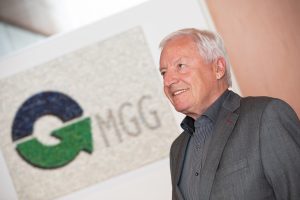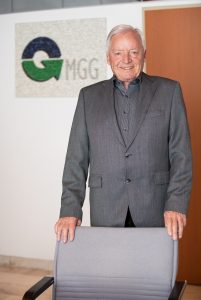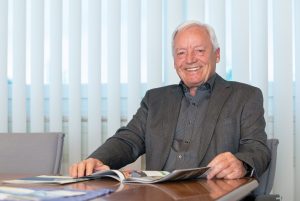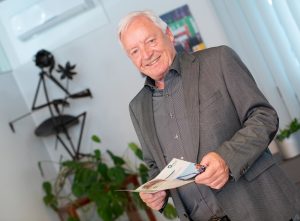 Herbert Müller-Guttenbrunn started his career in his father’s company in 1967. He moved the company from Waidhofen/Ybbs to Amstetten, grew with the company and rose to become managing director and handed over an international group of companies in 2006. He also worked for many years in the Chamber of Commerce in the field of secondary raw materials trading. For his commitment he was awarded the titles of “Commercial Councillor” and the “Golden Medal of Honour of the Province of Lower Austria”. However, the former MGG managing director is still not completely retired, as he reveals in this interview.
Herbert Müller-Guttenbrunn started his career in his father’s company in 1967. He moved the company from Waidhofen/Ybbs to Amstetten, grew with the company and rose to become managing director and handed over an international group of companies in 2006. He also worked for many years in the Chamber of Commerce in the field of secondary raw materials trading. For his commitment he was awarded the titles of “Commercial Councillor” and the “Golden Medal of Honour of the Province of Lower Austria”. However, the former MGG managing director is still not completely retired, as he reveals in this interview.
Mr. Müller-Guttenbrunn, the corona virus is currently keeping the world in suspense. How do you personally feel about it?
Herbert Müller-Guttenbrunn: Fortunately, everyone in our family is healthy – that is the most important thing. Personally, I use the time now to go hiking or to linger in the garden – even for things I haven’t done for ten years. In any case, everything is a little different now than usual.
Times were also a little different when you joined your father’s company in 1967. How did your start go?
Müller-Guttenbrunn: Yes, those were definitely different times. I was just 22 years old at the time and had completed a two-year internship in Kempten. There were only three of us in the company. Of course, everyone had to do everything – so I drove the truck, operated the cable excavator or worked with the metal press.
Mr. Müller-Guttenbrunn, you joined your father’s company at the age of 22. How did your start go?
Herbert Müller-Guttenbrunn: Yes, it was 1967, when I had just completed a two-year internship in Kempten. We were just three people back then. Of course, you had to do everything – so I drove the truck, operated the cable excavator, or worked with the metal press.
At that time the company was still based in Waidhofen/Ybbs. How did you experience the founding phase of your father’s company?
Müller-Guttenbrunn: I only know that I saw my father very little. During the day he was busy recycling scrap metal, at night he did business in his own bar in Waidhofen Castle.
The bar – or rather a partial heritage around the castle in Waidhofen – was the reason why the family came to the Mostviertel in the first place…
Müller-Guttenbrunn: That’s exactly how it is. I was born in Klagenfurt and grew up for five years. My father had an abrasives company there, which unfortunately burned down. He was then a salesman and worked for a scrap dealer for a short time – that’s why he somehow ended up in the scrap iron business. Because of the inheritance it was decided to move to Waidhofen and my father built up the bar here. There he got into conversation with the Russian occupying forces and with the Böhler employees. At that time there was a lot of iron to be worked off: The park behind the castle was a storage facility for old tank parts and disarmed ammunition. At some point, he started doing this as a sideline and the business continued to grow – even when there were no more old war relics to be worked up.
What were the reasons for this?
Müller-Guttenbrunn: One was certainly the always good cooperation with Böhler-Ybbstal-Werke. From my stay in Germany, I was familiar with the container system, which was new at the time and which we then introduced. In 1968, we set up the first containers at Böhler, with which we were the only company in Austria that was able to directly load onto the rail carriages. This was an important building block for our success, and we also grew with the important companies Welser and Forstner in the region of Waidhofen.
Due to the growth, the space in Waidhofen finally became too narrow, so that in 1976 the decision was made to go to Amstetten. You were already in charge there…
Müller-Guttenbrunn: Together with Johann Pölz, the mayor of Amstetten at the time, I found the company’s current premises. Pölz then helped us with the mediation via the federal railway. Of course, this was no comparison to today. It looked really bad. Everything was littered with bomb craters, some of which still contained wagons and lots of dud bombs. The excavator driver really needed courage back then to level everything here. Once that was done, we converted the sole proprietorship into a limited liability company in which my father, mother, brother and I each held a 25 percent share.
How did it go at the new location?
Müller-Guttenbrunn: Quite well and we have invested a lot. So, we bought the first large shears from Denmark relatively soon. At the beginning I was still a scissors operator – and I was also on the road with the truck from time to time. We already had around ten employees in the company, but I was happy to step in during the holiday period or when I was sick. In 1980 we put our first small shredder into operation, the so-called mill – and in 1984 we founded our first subsidiary, Metran, in Kematen.
At that time, your brother Dietrich was already working for the company. How harmonious was your cooperation?
Müller-Guttenbrunn: It always worked out well. My brother joined the company in 1978 after the restaurant in Waidhofen was sold. He took many tasks off my hands – for example, he took care of truck purchasing and looked after many of our suppliers. This left me time to devote to other activities – such as founding companies abroad. In any case, we always divided the tasks well and he always had my backing.
In 1985, you became managing director – but you had already taken over many of your father’s tasks before that…
Müller-Guttenbrunn: My father was a pilot in the war. The joy of flying has remained with him. Unfortunately, he had to make an emergency landing with a motor glider in Zell am See, where he was seriously injured. He had lost an eye, could hardly see anymore, and was hardly mobile – but he was still the boss and always in the office. Due to his impairment, I had to take over some of the work, of course, but always discussed everything with him – fortunately he always said yes to my suggestions. So, in 1985, before his death, we built the large shredder – its planning was the last major investment he witnessed. Unfortunately, he did not anymore witness the construction of our office complex during the following year.
 After his death you officially took over the agendas of the managing director – how would you describe yourself as the boss in retrospect?
After his death you officially took over the agendas of the managing director – how would you describe yourself as the boss in retrospect?
Müller-Guttenbrunn: I would say I was anti-authoritarian in meetings, authoritarian in decisions. After all, someone must call the shots – and that should be the boss.
Earlier you mentioned the founding of new subsidiaries abroad. Many of them are based in former Eastern Bloc countries. How adventurous were these company foundations shortly after the fall of the Berlin Wall?
Müller-Guttenbrunn: You can’t compare that with today. I often founded companies with people I had already dealt with before when purchasing raw materials. A lot of things were only done through state-owned companies, where you had to know exactly whom you were talking to and how you did this. Unfortunately, I also learned the hard way: the people I trusted most at that time often disappointed me. So, it didn’t always work out well economically with some managing directors with whom I got on well personally. Nevertheless, each and every one of these company foundations or shareholdings was a huge experience.
What attracted you to international expansion?
Müller-Guttenbrunn: It was simply exciting to get to know other people, other ways of living and thinking. In any case, you were much more appreciated abroad as a recycler. In Austria we were commonly known as dirty scrap iron dealers. It is only in the last 20 years that this esteem has increased.
Is there a special experience that immediately comes to mind when you think of the international companies in the Müller-Guttenbrunn Group?
Müller-Guttenbrunn: There would be very special experiences with which one could write books at every company foundation. The disposal of old cars has always been an important issue in our company. This was also the case with our expansion into Hungary. At that time there was a premium for scrapping old Trabants. I was just on site in Budapest when a couple drove up to the company site and said goodbye to their old car as if it were a funeral. The woman was even crying. You could see what value the car had for people.
What was the greatest value for you in the company?
Müller-Guttenbrunn: The greatest value of a company is definitely its employees. You can’t do anything on your own as boss, you need good people to achieve great things.
Great things have definitely been achieved in the Müller-Guttenbrunn Group. However, there are always one or two things that make you fail. What do you regret not having achieved?
Müller-Guttenbrunn: The project that cost me the most energy – and which was never realized – was the attempt to build an incineration plant and aluminum smelting plant in Kematen. Today, the whole thing would be considered a „green project“, because we wanted to use the heat to dry paper at the then called Neusiedler paper mill and to generate electricity. Although we had all the permits, it was never implemented – partly because our German partner went bankrupt. Unfortunately, the project had been so badly handled before that we had to put it on ice. But on the plot of land that was intended for the project is now the MGG Polymers plant, which my son co-founded. Many people tell me now that because of this failed project, companies such as Voestalpine or MGG Polymers were allowed to be settled there. That makes me proud – but this project has cost me a lot of nerves. But everything else was great fun.
What did you enjoy most when you think back to your time as managing director?
 Müller-Guttenbrunn: We played tennis every Friday for over ten years. These doubles games were always great fun when I was there – especially when we sat together after the game and talked about professional and private matters. There was already a lot of fun. On top of that, once a year we organised a tennis tournament where employees of our foreign companies also came. After that, events such as golf or go-karting were added – but I didn’t take part in that anymore. After the first time at the go-kart, everything hurt me – absolutely nobody takes any consideration! But we have been on the road a lot with motorized vehicles in the past and I still remember the motorcycle tours with the company employees very well. Riding bikes gave me great pleasure. And indeed, I still ride my bicycle with pleasure – up to 2,000 kilometres a year.
Müller-Guttenbrunn: We played tennis every Friday for over ten years. These doubles games were always great fun when I was there – especially when we sat together after the game and talked about professional and private matters. There was already a lot of fun. On top of that, once a year we organised a tennis tournament where employees of our foreign companies also came. After that, events such as golf or go-karting were added – but I didn’t take part in that anymore. After the first time at the go-kart, everything hurt me – absolutely nobody takes any consideration! But we have been on the road a lot with motorized vehicles in the past and I still remember the motorcycle tours with the company employees very well. Riding bikes gave me great pleasure. And indeed, I still ride my bicycle with pleasure – up to 2,000 kilometres a year.
From the bicycle back to business: your son Christian now runs the Müller-Guttenbrunn Group. How do you see the current situation?
Müller-Guttenbrunn: Christian is doing great, with all the other managers in the company. He has always been with the company as a holiday trainee during his studies. After his time abroad at Thyssen, he finally moved to the company as a controller and grew into his job. We must keep up with the current recycling issues – I’m only thinking of recycling in the e-cars, where there still has to be a solution. When I look at our figures for the last few years, a lot of things work – also because we have really terrific employees. That’s why we must also look to the future to have the right people in the right places. At the moment, it is hardly possible to predict anything with certainty because of the Corona crisis. Many things are still running as usual for us, but many companies are using short-time working, which is why production waste is decreasing. Nevertheless, I am convinced that the right decisions are being made in the company and that the Müller-Guttenbrunn Group will master this crisis well. But the most important thing first of all is that everyone remains healthy.
 You are absolutely right, of course. It is clear that you are not yet fully retired and are well informed about what is happening in the company. After all, you are still on the company advisory board and manage the business in the subcompany for property management and investments. So how often can you still be found in the company?
You are absolutely right, of course. It is clear that you are not yet fully retired and are well informed about what is happening in the company. After all, you are still on the company advisory board and manage the business in the subcompany for property management and investments. So how often can you still be found in the company?
Müller-Guttenbrunn: Thanks to my smartphone, I keep myself constantly up to date. Our controlling system works perfectly, so I always have the latest figures at my fingertips. When I’m in Amstetten, I like to come for a coffee with my son or the other employees. I may not come here for two or three months because I’m traveling the world. Then there are times when I am there two or three times a week. Then there are the various meetings of the company committees – so I’m in Amstetten quite often. But I also enjoy my time with my wife in our holiday home at Lake Balaton in Hungary or on cruises. Now this is not possible due to the Corona pandemic – so unfortunately, I had to cancel some planned tours. I hope for all of us that mankind will get this crisis under control quickly and that travel will be possible again soon.
We gladly support this wish, say thank you for the detailed conversation and wish you continued enjoyment of life, travel – and of course the activities around the Müller-Guttenbrunn Group!
